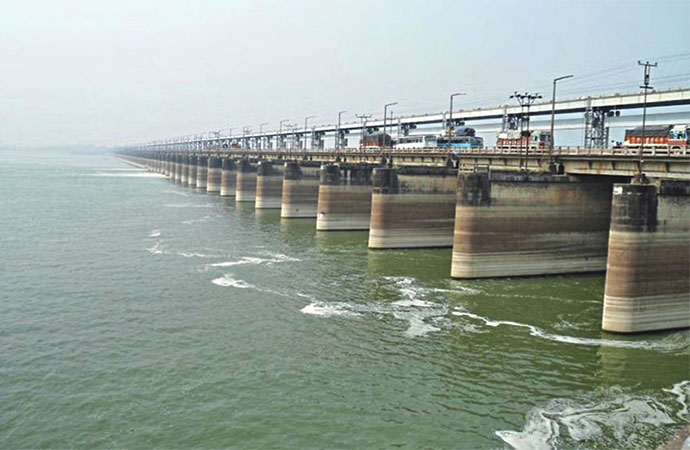Column

Photo: AP/UNB
The reform agenda of the interim government has the potential to lay the groundwork which can benefit a democratically-elected government in the future. In addition to the various reform commissions which have prepared reports for constitutional, administrative and human rights reform, the interim government is also implementing measures to restore financial discipline in the banking sector. Further economic and strategic policy reforms can reinforce the potential for an open, free and globally-integrated Bangladesh to flourish.
Tapping into the international goodwill, prestige and connections of Nobel Laureate Muhammad Yunus can help Bangladesh undertake bold economic and policy reforms which can reinforce the policies of future governments. Strategic reforms to liberalize the Bangladeshi economy can reinforce an environment for democracy to flourish in the future. The decision to appoint a private operator for the New Mooring Terminal in Chittagong Port should be welcomed. Chittagong Port has become an infrastructure bottleneck due to congestion and corruption. Privatizing the management of the port can increase efficiency.
The longstanding opposition to privatization among trade unions and socialists in Chittagong has hindered the capacity of the port to function as an efficient trade node. The recent position taken by the Bangladesh Nationalist Party (BNP) to oppose the interim government's decision to appoint DP World as the operator of the New Mooring Terminal reflects the growing influence of leftwing and socialist factions within the BNP. This was followed by a section of BNP activists mounting a blockade on the Chief Adviser's residence, leading to reports that Yunus considered resignation out of frustration at the intransigence of the BNP. In a strange twist of irony, the BNP is now advocating the same socialist position as the former Awami League mayor of Chittagong, A. B. M. Mohiuddin Chowdhury, who was a strong opponent of privatizing port management.
Yunus has his own ideas for reforming Chittagong Port. In 2006, while delivering a speech on working with India and China for the regional economy, Yunus proposed the idea of transforming Chittagong Port into a publicly-listed social business entity which would be floated on a social business stock exchange and owned by downtrodden shareholders. Yunus is therefore open to the idea of privatizing Chittagong Port and listing it on the stock market.
UAE-based DP World has expressed interest to operate the New Mooring Terminal. DP World has operations in 78 locations, including in China, India, Pakistan and the UK. It is arguably one of the leading port management companies in the world. DP World's interest in Chittagong Port can be traced back to the last BNP government between 2001 and 2006. Hence, the BNP's opposition to DP World's proposal is a sharp turnaround for a party which historically pioneered economic liberalization and began Bangladesh's transition to a market economy.
Opposing Yunus on privatizing Chittagong Port reflects the sharp leftwing turn of the BNP under Tarique Rahman, Mirza Fakhrul Islam Alamgir and their coterie of pro-BNP civil society. Is it mere political opportunism or a serious tilt towards the left? Jon Danilowicz, a former American diplomat stationed in Dhaka, has compared the BNP with the Bolsheviks who hijacked the Russian Revolution. The liberal interim government which was established after the abdication of the Tsar was upended by the October Revolution of the Bolsheviks.
Others have drawn comparisons with the Iranian Revolution. The caretaker government which was formed after the fall of the Shah of Iran was eventually overtaken by the Ayotollahs. The political opportunism of the BNP risks upending the July Revolution in Bangladesh. The blockade of the Chief Adviser's residence, which was ostensibly aimed at installing a BNP leader as the mayor of South Dhaka, was a risky endeavor that threatened to overturn the July Revolution.
On the foreign policy front, the BNP has gone haywire over talks for a safe zone and humanitarian corridor to facilitate Rohingya repatriation to Myanmar. The BNP has demanded the resignation of Bangladesh's first National Security Adviser Dr. Khalilur Rahman and falsely accused him of being a foreign citizen and colluding with external powers.
Shahiduzzaman, a rightwing commentator and professor of Dhaka University, expressed dismay at the BNP's stand by pointing to BNP founder Ziaur Rahman's age-old acquaintance with Dr. Khalilur Rahman. Shahiduzzaman also dismissed the criticism levelled at the NSA for being a non-military man by pointing out that most NSAs in the world are civilian experts.
Reforms in foreign policy by the interim government can lay the groundwork to facilitate a comprehensive solution to the Rohingya crisis in the future, including by a potential BNP government. However, the BNP is opposing the interim government's concept of channeling humanitarian aid to war-torn regions in neighboring Myanmar's Rakhine State.
The BNP appears overconfident. It fails to understand that the dynamics of the current Rohingya crisis are vastly different from the dynamics of 1978-79 and 1991-92. Bangladesh has to secure civil and political rights for the Rohingya to ensure sustainable, voluntary, dignified and safe returns for the refugee population.
Bangladesh is currently hosting 1.1 million Rohingya refugees and is one of the largest refugee hosting countries in the world. The interim government has opened contacts with the Arakan Army to encourage inclusive governance in Rakhine State. Much of Rakhine State is now under the control of the rebel Arakan Army.
There is a real risk of famine in Rakhine State. The interim government can lay the groundwork by engaging with the international community for a safe zone and humanitarian corridor which would create conditions for the Rohingya to return. A future BNP government can benefit from this groundwork and pursue a comprehensive solution to the Rohingya crisis.
The BNP needs to clarify its Rohingya policy. If the Rohingya cannot return to Myanmar, Bangladesh faces the prospect of absorbing and integrating millions of new citizens. Will the BNP prefer to absorb and integrate the refugees instead of repatriation?
The minimalist view of reforms, which is being advocated by the BNP leadership, takes the view that the interim government has a mandate which is limited to electoral reforms. The problem is that without strong economic and political reforms across the board, there is a risk that Bangladesh will slide into electoral autocracy. The interim government must adopt bold reforms to reinforce Bangladesh 2.0, including significant policy and economic reforms.
Umran Chowdhury is Assistant Editor of the Dhaka Courier and a Research Associate at the Cosmos Foundation and Bay of Bengal Institute.

























Leave a Comment
Recent Posts
Right On Schedule
The most eagerly anticipated, and frankly hyped up, announcement of an ...
Fighting raged along the borde ...
Fighting raged along the border of Cambodia and Thailand, with explosi ...
ICIMOD drives regional cooperation to inspire new mo ..
The Cage of Captivity and the Cry for Freedom: A Cru ..
Why Japan issued an advisory for a possible megaquak ..
The Autocrats’ War on Universities